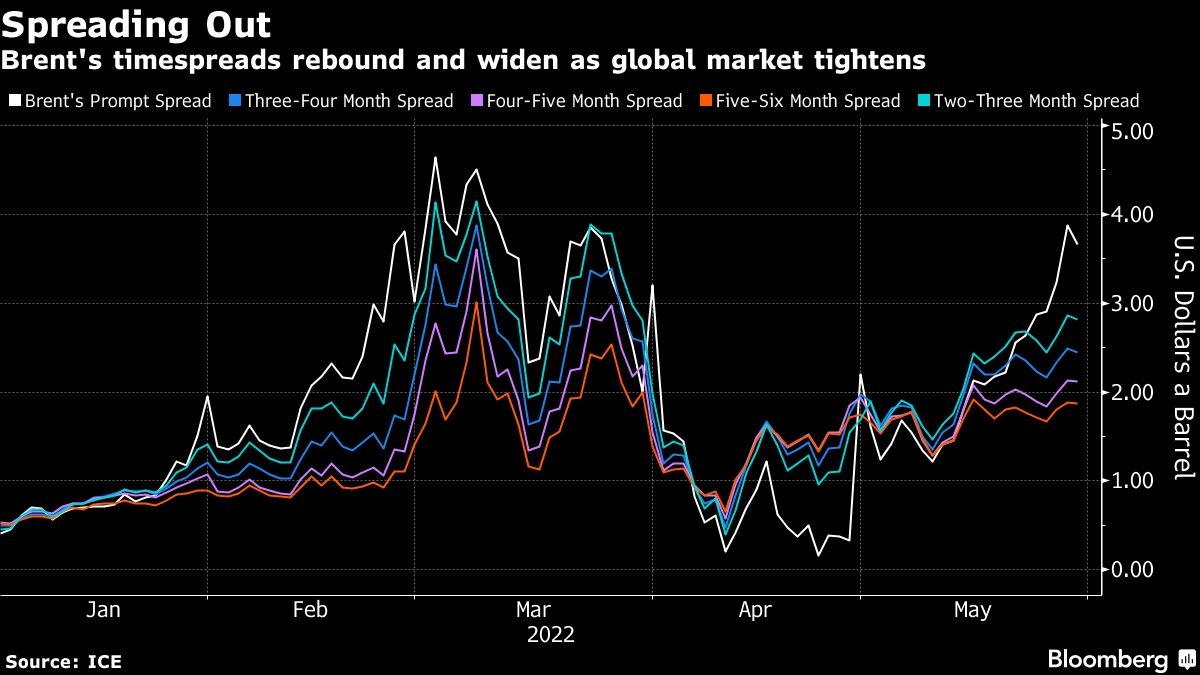May 30, 2022
Brent crude hits US$120 as China eases curbs, EU eyes Russia ban
, Bloomberg News
Global oil demand should reach fresh all time highs this year: Rory Johnston
Oil climbed to a two-month high as China eased anti-virus lockdowns and the European Union worked on a plan to ban imports of Russian crude.
Brent crude rose above US$120 a barrel during the session, extending last week’s 6 per cent rally, to reach the highest intraday level since March 25. China’s key commercial hub of Shanghai allowed all manufacturers to resume operations from June, while officials said Beijing’s coronavirus outbreak is under control. Trading in U.S. crude futures was muted due to the Memorial Day holiday.

EU leaders intend to reach a political agreement on Monday on an embargo on Russian oil to punish Moscow for its invasion of Ukraine, according to an official who spoke on condition of anonymity. The bloc failed on Sunday to agree on a revised sanctions package. Hungary is so far refusing to back a compromise despite proposals aimed at ensuring its oil supplies keep flowing.
Brent crude is on course for a sixth straight monthly climb, in what would be the longest such run in more than a decade. The advance has been driven by the fallout from the war in Ukraine, as well as increased demand as more economies return from COVID-related restrictions. In the US, the summer driving season kicked off at the weekend with retail gasoline prices surging to a record.
According to GasBuddy data, weekly US gasoline demand rose 0.5 per cent during Saturday and Sunday compared to the previous week and was 1.2 per cent above the average of the last four weeks.
“It’s tight supply, Chinese demand and the beginning of the US driving season in focus,” said Ole Hansen, head of commodities strategy at Saxo Bank A/S. At the same time, OPEC+ has fallen behind production targets and is struggling to meet quotas.
Prices:
- Brent for July settlement rose as much as 0.9 per cent to US$120.50 a barrel on the ICE Futures Europe exchange, before trading at US$120.47 as of 11:19 a.m. in New York.
- The August contract, which has more volume and open interest, added 1 per cent to US$116.72 a barrel.
West Texas Intermediate for July delivery gained 1 per cent to US$116.14 a barrel on the New York Mercantile Exchange.
China’s dogged adherence to its COVID Zero policy at all costs -- epitomized by Shanghai’s lockdown that began in late March -- has sapped energy demand, and an easing would help to support global consumption. Administration officials have both warned of the economic damage stemming from the curbs, and pledged support to offset the impact.
With a meeting due this week of the Organization of Petroleum Exporting Countries and allies on supply policy, leading member Saudi Arabia is expected to boost its official July prices. Saudi Aramco may raise Arab Light for sales to Asia next month by US$1.50 a barrel, a Bloomberg survey showed.
The oil market is steeply backwardated, a bullish pattern marked by near-term prices trading at a premium to longer-dated ones. Brent’s prompt spread -- the difference between its two nearest contracts -- was US$3.71 a barrel on Monday, up from US$1.34 a barrel three weeks ago.
The surge in energy prices has contributed to a sharp pick-up in the pace of inflation, spurring central bankers to move toward tighter monetary policy. Data this week will likely show record price gains in European economies.


